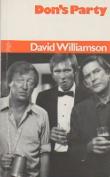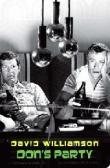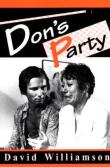AustLit
Latest Issues
Adaptations
-
form
y
 Don's Party
( dir. Bruce Beresford
)
Sydney
:
Double Head Productions Pty Ltd in association with the Australian Film Commission.
,
1976
Z42782
1976
single work
film/TV
satire
(taught in 3 units)
Don's Party
( dir. Bruce Beresford
)
Sydney
:
Double Head Productions Pty Ltd in association with the Australian Film Commission.
,
1976
Z42782
1976
single work
film/TV
satire
(taught in 3 units)
Set in a suburb of Sydney's North Shore on the night of the 1969 Australian Federal Election, this is a cinematic adaptation of David Williamson's 1971 satire of university-educated, upwardly mobile Australian Labor Party supporters. The gathering is hoping to celebrate the ALP's victory after two decades of conservative government, but as the results are televised throughout the night, this appears increasingly unlikely. The men then devote their energies to drinking and debauching with the younger women, much to the anger of their wives or girlfriends. As the night wears on and hopes fade, there is fighting and much disappointment.
The film's satire (as with the play) achieves its bite through a sense of what passes for naturalism. The essential ockerism of the men becomes more apparent as the party degenerates and the alcohol takes over. The critical focus sharpens and the humour becomes more cynical.
Production Details
-
First produced by the Australian Performing Group at the Pram Factory, Melbourne, 11 August 1971. Director: Graeme Blundell. A revised version was produced at the Jane Street Theatre, Sydney, 29 June 1972. Director: John Clark. Also produced at the Royal Court Theatre, London, 1974.
-
Revised version performed at the Melbourne Theatre Company and Sydney Theatre Company, Playhouse, Arts Centre, from 11 January to 10 February 2007
Publication Details of Only Known VersionEarliest 2 Known Versions of
Other Formats
- Also braille, sound recording
Works about this Work
-
[Review] Don's Party
single work
review
— Review of Don's Party 1971 single work drama -
“Friendship, but Bloke-ier” : Can Mateship Be Reimagined as an Inclusive Civic Ideal in Australia?
2022
single work
criticism
— Appears in: Journal of Australian Studies , vol. 46 no. 2 2022; (p. 196-210)'In 1999, John Howard attempted to insert the word “mateship” into the Constitution, arguing that it had been reimagined as an inclusive national ideal. This article looks at the history and meaning of mateship, followed by a discussion of contemporary Australian attitudes towards it. The data we use in this article is from a voluntary survey (the Australian Mateship Survey) conducted by the authors, which asked respondents (N = 576) how they define mateship and how they feel about the term. The results indicate that a majority think mateship is a key feature of Australian identity but have concerns when the idea is politicised. A sizable minority believe the term is gendered and racialised and, therefore, is not inclusive of all Australians. Further, the survey suggests that a wide range of opinions exists even among those who do believe mateship has national significance. Twenty years after Howard’s attempt to enshrine mateship in the Constitution, this article suggests that the concept remains too divisive to serve as a core Australian value.' (Publication abstract)
-
“Smash Sexist Movies” : Gender, Culture and Ocker Cinema in 1970s Australia
2022
single work
criticism
— Appears in: Journal of Australian Studies , vol. 46 no. 2 2022; (p. 181-195)'The 1970s is often characterised as the decade of Australia’s “new nationalism”, expressed most potently in a wave of cultural activity nurtured by government funding. The figure of the ocker was central to this new nationalism, particularly in film. The ocker, a contemporary masculine archetype devoted to beer, sex and swearing, was a star of Australian films such as The Adventures of Barry McKenzie, Alvin Purple, Petersen and Don’s Party. Yet few scholars have considered the ocker in a gendered context, remarkable when we consider that while the ocker films were being produced, the women’s liberation movement was mounting a radical challenge to Australian cultural, social and political norms. What new understandings of 1970s society and culture might result if we read the new nationalist ocker and women’s liberation in the same frame? This article examines the relationship between ocker culture and women’s liberation in the 1970s. It argues that we can read new nationalist popular culture as a site of gendered cultural contest, with a particular focus on feminist responses to ocker culture, including Alvin Purple, and a reading of the film Petersen.' (Publication abstract)
-
Don’s Party at 50 : An Achingly Real Portrayal of the Hapless Australian Middle-class Voter
2021
single work
essay
— Appears in: The Conversation , 10 August 2021;'The play Don’s Party premiered on August 11 1971 at Carlton’s Pram Factory, home to the radical theatre ensemble, the Australian Performing Arts Group.'
-
'Strong Actor' : Nick Tate
2016
single work
biography
— Appears in: Players : Australian Actors on Stage, Television and Film 2016; 'After more than fifty years as an actor Nick Tate recalls the opening night of Don's Party at the Old Tote Theatre in Sydney on 20 September 1972 as ‘thrilling’ and ‘extraordinary’. Standing on stage at the curtain call alongside Pat Bishop, Wendy Blacklock, John Ewart and the other cast members, Tate felt a sense of pure pride and satisfaction ‘to be involved with an Australian production of that quality… It was a huge landmark in my life’ Tate recalls. The success of the production was gratifying, particularly as he had very nearly given away the chance of playing Don, and had so many misgivings initially. Tate was thirty years of age when he appeared in the Williamsonplay. From that day on he did not question his future.' (Introduction)
-
Don's Party Was a Knock-Out
1972
single work
review
— Appears in: The Sydney Morning Herald , 1 July 1972; (p. 16) A Leader of His Craft : Theatre Reviews by H. G. Kippax 2004; (p. 177-179)
— Review of Don's Party 1971 single work drama -
Or Its Most Laborious Party?
1972
single work
review
— Appears in: Nation Review , 15-21 July 1972; Creme de la Phlegm : Unforgettable Australian Reviews 2006; (p. 141-142)
— Review of Don's Party 1971 single work drama -
Revival of Party Animals
2007
single work
review
— Appears in: The Age , 13 January 2007; (p. 23)
— Review of Don's Party 1971 single work drama -
Fight the Right and Party : The Time Seems Right for a Revival of a 1970's Satire
2007
single work
review
— Appears in: The Age , 8 January 2007; (p. 8)
— Review of Don's Party 1971 single work drama -
Show of the Week
2007
single work
review
— Appears in: The Sunday Age , 21 January 2007; (p. 31)
— Review of Don's Party 1971 single work drama -
The Making of Don's Party
2003
single work
criticism
— Appears in: David Williamson : A Celebration 2003; (p. 13-19) -
The Party's Nearly Over
2004
single work
column
— Appears in: The West Australian , 9 October 2004; (p. 10-11) -
A Human Bower Bird
Annmaree O'Keeffe
(interviewer),
1975
single work
interview
— Appears in: Semper Floreat , July vol. 45 no. 10 1975; (p. 7) -
Is Don, is Good - Over and Over Again
2007
single work
column
— Appears in: The Sunday Age , 7 January 2007; (p. 7) -
Party Like It's 1971
2007
single work
criticism
— Appears in: The Weekend Australian , 25-26 August 2007; (p. 16-17) Rosemary Sorensen discusses David Williamson's 1970s plays The Club and Don's Party in the light of revival productions in 2007.
Awards
- 1973 winner AWGIE Awards — Stage Award
- Melbourne, Victoria,
- 1970s






